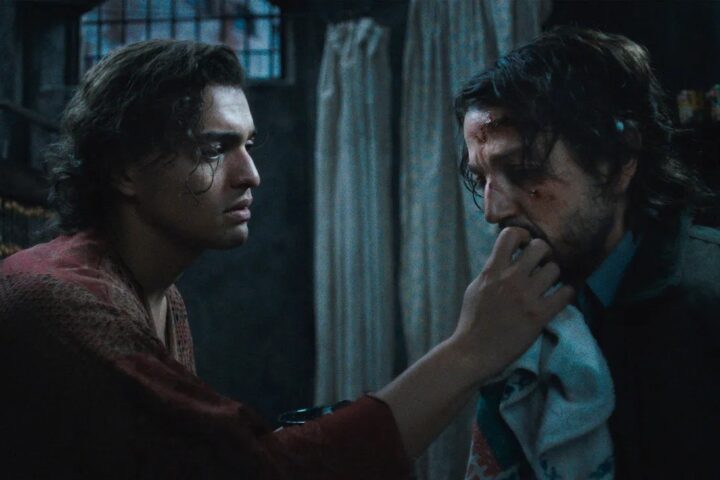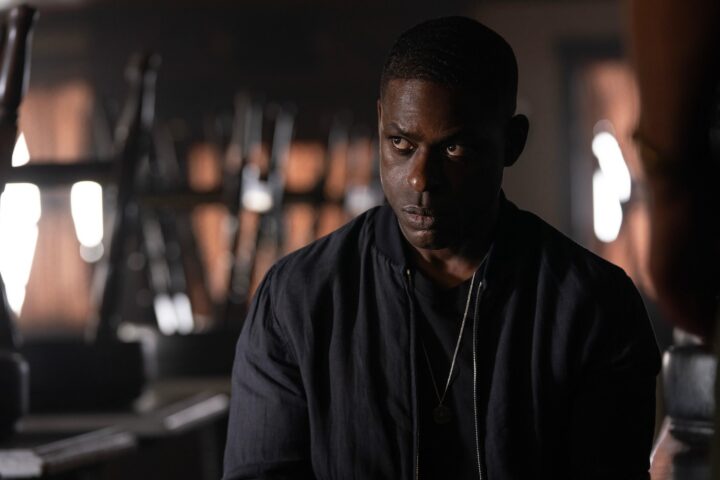In recent years we’ve seen plenty of TV shows that seem like they should have been movies, and a few movies that might have been better as TV shows. Atlas suffers from a similar problem but fits into a third, lesser-seen category because, while it draws heavily from a number of classic sci-fi films, it’s a movie that seems like it really wants to be a video game.
Brad Peyton’s film opens with an expository montage introducing us to a world where an army of self-aware A.I.-driven robots, led by an android known as Harlan (Simu Liu), are waging an all-out war against humanity. And just as things appear to be reaching a point of no return, mankind whips out a surprise superweapon and quashes the rebellion, sending Harlan scarpering away on a rocket ship vowing that one day he’ll be back to finish what he started.
Ironically for a film that’s all about A.I., the whole premise of Atlas is basically what you’d get if you fed ChatGPT the prompt “what if Terminator but very, very dumb.” Which is, in the end, a redundant task, and no matter how you feel about A.I.’s threat, given that the Terminator franchise has already spat out an answer to that question on at least two occasions.
Flash forward a few decades and a brilliant data analyst, Atlas Sheperd (Jennifer Lopez), has managed to uncover the location of Harlan’s secret lair on another planet. A crack team of elite robo-killers are assembled to go and put him out of commission and Atlas insists upon being part of the team. After all, her mother, Val (Lana Parrilla), created Harlan and she knows him better than anyone. Plus, some half-obscured flashbacks also lead us to believe that she might have another reason for wanting to take him down. Probably one involving Trauma™.
The cocksure Colonel Elias Banks (Sterling K. Brown), who’s running the operation to hunt down Harlan, initially pushes back on Atlas’s request, because not only is Atlas a civilian with no military experience, she also has a personal grudge against A.I. That Banks takes offense to the second part is incredibly strange, as you’d think that most humans would be firmly anti-A.I. given that robots tried to commit a planetary genocide barely 30 years ago, yet Atlas’s concerns are summarily dismissed as doom-mongering conspiracy theories.
In general, the timeline of Atlas’s world always feels a little funky. Its world is one where mankind soars through the stars in futuristic spaceships and fights wars in mech suits out of a James Cameron movie (there’s even a gag involving a mech and a coffee cup that’s straight out of Avatar: The Way of Water). But we also hear Val reminisce about her old smartphone. Even if you accept that a major A.I. breakthrough is supposed to have catapulted humanity forward, the world of Atlas still comes off as an awkward mash-up of near-future and far-off space opera, with people who talk and act like us stranded in a digitally conjured world of tomorrow.
Atlas’s request is eventually accepted only for the mission to quickly go awry, leaving her alone inside a mech suit, fighting for survival against Harlan and his minions. That also means she has to get to grips with the suit’s A.I., Smith (Gregory James Cohan), learning to trust him enough that the two can synch up, Pacific Rim-style, and act as one devastatingly powerful robo-human warrior. Atlas and Smith quickly become a fairly amusing double act, with the latter using his robot voice to deliver deadpan rebuttals to the former’s increasingly frustrated questions.
From the moment our hero straps herself into the mech suit, Atlas seems like a story that should have been experienced with a gamepad in hand. We get a tutorial sequence, as Smith takes Atlas through the suit’s various functions and weapons. He also explains the progress bar that measures their level of connection to one another, and how it will open up new abilities for them as it fills. The screen regularly fills with little icons highlighting objects and enemies, and one fight scene even briefly switches to the perspective of a first-person shooter.
The action scenes themselves are about what you would get from a modern AAA title. They’re all reasonably well conceived and clearly framed but with a shiny, weightless quality that ensures you never forget that you’re watching something completely computer-made. (Lopez tries her best as the Ellen Ripley-esque figure at the center of it all, but you can never shake that she was effectively confined to a desk chair while digital artists built the rest of the movie around her.) The film even culminates in a fiery one-on-one boss fight. With some solid combat mechanics, Atlas might have been a lot of fun to play. As a movie it’s simply watchable without ever achieving—or seemingly even really trying to achieve—more than that.
Since 2001, we've brought you uncompromising, candid takes on the world of film, music, television, video games, theater, and more. Independently owned and operated publications like Slant have been hit hard in recent years, but we’re committed to keeping our content free and accessible—meaning no paywalls or fees.
If you like what we do, please consider subscribing to our Patreon or making a donation.






